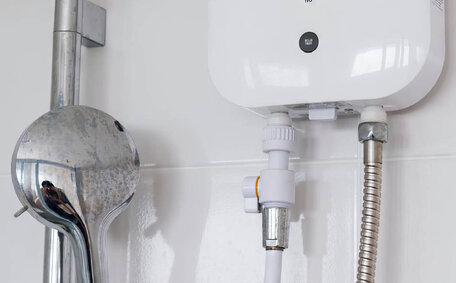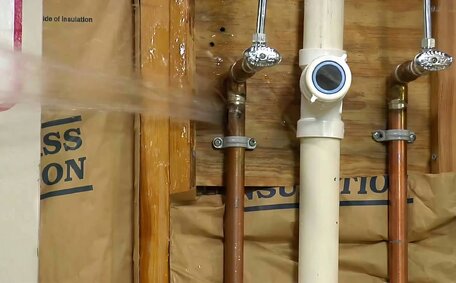Introduction to Gas Line Inspections
Consistent gas line checks are essential for home safety, safeguarding against risks like gas leaks and carbon monoxide exposure.
Our guide provides actionable tips for homeowners on caring for gas lines, scheduling inspections, spotting issues, and upholding safety between expert visits.
We’ll be exploring topics such as:
- The importance of periodic gas line inspections
- How often inspections should occur
- What to look for when self-inspecting
- Steps for a DIY visual check
- When to call in professionals
- Maintaining proper documentation
Using these insights, homeowners can manage gas line inspections to maintain leak-free and compliant systems and know when to conduct safety assessments to reduce hazards.
Recommended Gas Line Inspection Intervals
It’s critical to ensure natural gas line inspections take place at least every 1-2 years, with older homes needing annual reviews for assured safety. Households with a water heater running on gas may need to schedule gas line checks more frequently, every 6 months.
Local regulations may differ, but typically, gas lines should be inspected annually for compliance with state requirements. This accounts for regular wear tear experienced over time. More extensive certifications are typically required to address any problems gas systems in older properties might have every 10 years.
Apart from satisfying legal mandates, routine inspections provide peace of mind. They can identify early issues with your gas appliances and the natural gas piping like leaks, allowing preventive repairs before major problems arise. This helps make sure to fortify your household against risks including fires, explosions, and carbon monoxide poisoning.
Maintaining gas safety requires year-round vigilance, ensuring both air conditioning and gas systems are functioning correctly. Look out for warning signs between professional visits like the smell of gas, visible pipe damage or appliance issues. Report these immediately to gas fitters for assessment.
Document all gas line maintenance work thoroughly and retain all inspection certificates. This documentation is essential for insurance and key if you’re considering selling your property.
What to Look for When Inspecting Gas Lines
Inspect your appliance gas line and meter for signs of corrosion, damage, or leaks. Key things to check include:
- Rust spots or holes on exposed stainless steel pipes
- Dents, cracks or evidence of impact damage
- Loose fittings, connectors or joints
- An oily sheen or residue around fittings
- Bubbles forming in soapy water used to test for leaks
- Any dirt or debris buildup, which could conceal damage
- The smell of rotten eggs or sulphur, indicating a gas leak
Examine the surrounding area for unusual noises or blowing debris that may indicate a gas escape. Be aware that leaks can cause issues with starting or irregular flames/heating which might reflect problems with the supply lines.
Carefully survey all visible interior and exterior gas piping, including the water heaters, and call plumber services during gas inspections. When surveying, consider potential trouble spots and maintaining gas lines vigilantly, especially in areas prone to movement/vibration, underground lines, flood zones or locations exposed to extreme weather.
If you suspect a leak or identify gas line damage, promptly contact a qualified, licensed heating engineer for emergency repairs. Ignoring warning signs is risky; early detection of gas leaks can prevent hazards.
Checking for Gas Leaks
Homeowners can use various methods to check for gas leaks:
- Smell test - If you can smell the added odorant in natural gas that makes it smell like rotten eggs, it likely indicates a leak. If you detect this scent, especially near your gas appliance, metres or pipes, it likely indicates a gas leak.
- Bubble test - Apply a soapy water solution with a brush or spray bottle on areas you suspect a leak. If you see bubbles forming, this signifies escaping gas.
- Combustible gas detector - Handheld detectors can identify natural gas leaks quickly. Look for ones meeting UL or IEC safety ratings.
- Pressure test - Licenced technicians conduct calibrated pressure tests on lines and use specialised leak detection equipment.
Trust your instincts - if you detect the distinct odour of natural gas or notice signs like debris blowing from a pipe, immediately take safety measures and call for plumbing services. Contact a professional gas fitter to inspect all issues. They can conduct extensive gas leak detection and line integrity tests as well as any necessary repairs.
Importance of Routine Inspections
Adhering to regular professional inspections, gas piping should receive critical attention for ongoing safety. Preventative maintenance helps avoid potentially disastrous problems like gas leaks, explosions or carbon monoxide exposure.
Although an annual professional inspection typically meets legal standards, older houses or high usage systems may require more frequent, biannual checks. This allows early detection of issues from normal wear and tear.
Regular inspections also uphold safety and are vital for insurance purposes. Retain copies of inspection certificates for your records.
Homeowners must remain alert, conducting their own visual checks for warning signs of leaks or damage, especially on exposed piping. Trust your senses – if you smell gas, hear odd noises or see debris blowing from pipes, contact gas specialists immediately for emergency repairs before small issues escalate.
Conducting a Homeowner Gas Line Inspection
Homeowners may perform a basic visual check of natural gas appliances for signs of leaks or damage. This involves:
- Visually inspecting all interior and exterior gas pipes and lines for issues like leaks, cracks, corrosion, loose fittings or odd smells.
- Listening for any unusual hissing sounds coming from gas appliances or lines.
- Applying soapy water to joints and connections then checking if bubbles form, signalling a potential leak.
- Surveying for dirt/debris blowing from pipes or water puddles where equipment sits, indicating a leak.
- Testing gas appliances to ensure proper operation and ventilation.
Exercise extreme caution to guarantee safety during inspections. Evacuate all occupants immediately if you smell gas or confirm a leak exists. Call emergency services then contact a licenced technician for repair before turning off your gas supply back on.
Mark areas where gas is detected for further evaluation to monitor these locations more frequently. Document any damage found and keep certificates showing line checks or repairs.
Preparing for Inspection
Proper preparation is key to address any needs and ensure gas line inspections are conducted efficiently while keeping occupants safe.
Before an inspection, provide easy access to all gas lines, appliances, and use your hot water system equipment with care. Clear clutter or storage items blocking areas requiring assessment, especially around hot water systems or exterior piping.
Have any necessary tools on hand for inspectors like a non-corrosive leak detection spray, liquid dish soap or a combustible gas detector. Ensure adequate ventilation around appliances.
Notify all residents of the scheduled inspection and advise against smoking or using any gas appliances prior to the visit. This allows technicians to check all aspects thoroughly for issues.
Steps to Inspect Gas Lines
Homeowners can perform a basic visual gas line inspection by following these steps:
- Visually check all exterior gas connection points and your gas meter for corrosion, cracks, leaks, damage or debris buildup. Note any areas of concern.
- Survey interior gas lines in the basement, garage and near appliances. Look for signs of wear, leaks, odd smells or sounds.
- At joints and connections, brush or spray a non-corrosive soap solution and check your work for bubble formation. Inspect your gas connections and observe if any bubbles form, indicating potential leaks.
- Check gas appliances and pipes closely; listen for any hissing noises suggestive of escaping gas.
- Check appliance operation and ventilation as irregular performance can reflect supply issues.
Use extreme care and immediately call gas emergency services about any confirmed or possible leak. Evacuate all occupants until the issue is repaired by licenced technicians.
When Professional Assistance is Required
It’s crucial to contact a licenced professional for gas line inspections or repairs in several situations, including:
- You smell gas or suspect any kind of leak
- Appliances exhibit irregular performance, incomplete combustion or odd smells
- You discover damage, corrosion or leaks in pipes/lines
- After events like floods, earthquakes or storms that may have impacted lines
- For major system work where you require new gas installation or new appliances
- When lines fail mandated safety checks or don’t meet code
- Certification inspections are due per local regulations
- You need documentation for real estate or insurance purposes
Recurring leaks, constant unusual odours, or appliance malfunctions require a specialist’s attention instead of DIY repairs. Technicians have extensive training to accurately assess plumbing problems, certification and equipment to conduct repairs safely.
Homeowners shouldn’t attempt to fix damaged lines, leaks or appliance connections on their own due to the skill and licensed gas tools required. Severe injuries or property damage from gas-related incidents can result from improper work. Always hire qualified technicians for anything beyond minor maintenance.
Hiring a Licensed Professional
It’s critical to hire a licenced professional for plumber gas line work and other major gas-related tasks. This includes comprehensive inspections, leak detection, repairs, replacement, new installations and certification.
While homeowners can conduct basic visual checks during inspections between professional visits, one must remember that you may need gas line specialised attention; attempting DIY repairs or installations risks severe injuries, property damage or even loss of life from fires or explosions resulting from improper work.
Licenced technicians undertake extensive training and certification for working safely on gas lines and these components associated with gas systems. They possess specialised equipment, expertise and experience assessing issues, conducting repairs to code and documenting necessary compliance records.
Verify that gas fitting technicians hold valid licences and ensure their business provides full insurance coverage for your home. Obtain multiple quotes outlining proposed work and timeframes. Check reviews of our team’s past services completed by clients as well.
Professionals should explain inspection findings related to your property, answer questions about in plain terms and provide written reports for documentation. Never feel pressured into unnecessary work. However, issues where gas can escape and other urgent matters should be addressed immediately to restore safety.
Addressing Safety Issues
If you ever suspect a gas issue or leak, immediate action is paramount, and it’s best to follow these guidelines to prevent potential disaster:
- Evacuate all occupants and pets from the area until safe to re-enter
- Do not turn any electrical devices or switches on or off. Eliminate all ignition sources
- From a safe location, call 000 immediately then contact your gas company’s 24 hour emergency line
- Do not re-enter the property until the gas company confirms the leak has been repaired and it’s certified safe
- Only use external ventilation fans if you can do so without risk, to help dissipate gas
- Have your system evaluated by qualified technicians before resuming gas supply or reoccupying the space.
Technicians use advanced leak detection equipment to precisely locate leaks and service your gas requirements. They can then get gas line repair and restore safe operation conducted. Never disregard warning signs - responding promptly can limit risks.
Maintaining Compliance with Regulations
It’s crucial for homeowners to understand and comply with laws and regulations governing residential gas systems. Neglecting to schedule regular check-ups with a licensed plumber for mandatory inspections or safety measures can cause substantial fines or legal liabilities.
Regulatory requirements may differ across states but often include:
- Periodic safety inspections by licenced technicians, from annual to every 10 years
- Re-certification when selling property or after major repairs
- Proper documentation showing current compliance status
- Adhering to piping material, connector and venting standards
- Maintaining leak protection devices on systems
- Following appliance operation, maintenance and clearance instructions
Check the plumbing standards for your local council to ensure adherence and prevent non-compliance. Keep detailed service and inspection records showing safety checks were completed to the proper standard and timescale. Having current certification available is essential.
If unsure what regulations apply for equipment replacements, gas line work or mandatory safety inspections, contact qualified technicians. They can ensure installations and servicing of gas piping in your residence meet all legal benchmarks. Stay vigilant about arranging required periodic checks to avoid fines.
While compliance helps avoid penalties, remember that adhering to gas heating and safety regulations ultimately protects your family. Preventative maintenance greatly reduces risks from leaks, explosions and carbon monoxide poisoning by identifying and addressing issues early.
Record Keeping
Meticulous record keeping is crucial for gas line inspections. Homeowners should maintain an ongoing log of gas line inspection done, noting the date of each check, company/technician completing the work, any issues found, and repairs undertaken. Keep copies of all inspection reports and compliance certificates.
Maintaining completed logs helps identify patterns, such recurring leaks, ensuring accurate focus on vulnerable inspection areas. Comprehensive documentation also serves as proof for insurance claims and real estate sales, confirming safety checks met legal standards. Records may be required when renewing policies or listing a property to confirm assessments were properly completed by accredited professionals.
external inspections, note any unusual appliance performance between checks on your pipes gas. This aids troubleshooting of potential underlying supply line problems and helps maintain gas system integrity. Documenting issues early also means minor repairs prevent major issues later.
Safety Certification
Homeowners can request safety certification for gas lines from licenced technicians after inspections or major repairs. Certificates confirm assessments were conducted properly to code and systems are currently safe and leak-free.
Although not universally required, gas safety certification is imperative for assurance and documentation. Keep copies to verify safety compliance when renewing insurance policies, selling property or planning renovations requiring permits.
Safety certificates outline the date of assessment, company performing the work, inspection methods utilised, as well as any repairs undertaken. They may also list re-inspection due dates. Review certificates to ensure licences are current and all aspects appear reputable before filing for future reference.






